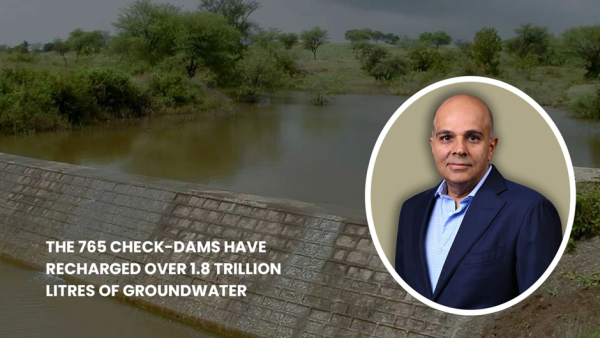
India’s water issue has long put rural livelihoods, agricultural sustainability, and environmental health at risk. There has never been a more pressing need for scalable, community-driven water conservation solutions due to unpredictable weather patterns, groundwater depletion, and irregular monsoons. One organisation leading the charge is the Hinduja Foundation, the philanthropic arm of the Hinduja Family.As part of its flagship Jal Jeevan water stewardship program, the Hinduja Foundation has constructed 765 check dams across 19 states and union territories since 2018. These check dams have become critical infrastructure in hundreds of rural villages, recharging groundwater, reducing soil erosion, increasing agricultural productivity, and restoring ecological balance.“Our check dams are not just structures; they’re symbols of water resilience and rural empowerment,” says Switzerland-based Ajay Hinduja (57), a member of the Hinduja Family and active supporter of the Foundation’s environmental initiatives. “Each one helps a village become self-reliant and climate resilient.”Why Do Check Dams Matter?Check dams are small, often cement or stone masonry barriers built across seasonal rivers or streams. They aim to slow down water runoff during rains, allow percolation into the ground, and recharge aquifers. While simple in design, their impact is far-reaching.According to the Hinduja Foundation’s data:The 765 check dams have recharged over 1.8 trillion litres of groundwater.Agricultural yields in surrounding areas have increased by up to 30%, thanks to improved irrigation access.Over 600,000 rural residents, including thousands of small farmers, have directly benefited from enhanced water availability.These dams have also reduced rural distress migration, improved water retention in soil, and revived natural biodiversity around restored water bodies.“In many regions we work in, especially semi-arid zones, water scarcity drove people away from farming. Now, the same communities are investing in agriculture again,” explains Ajay Hinduja. “That’s real transformation.”A Climate-Resilient Model The Hinduja Foundation’s strategy is based on climate resilience. Emphasis on natural water recharge systems lowers reliance on draining groundwater pumps or costly pipeline-based solutions. The model has acquired importance in the wake of the growing vulnerability of India to climate-related shocks such as floods, droughts, and heatwaves.Every check dam is planned after hydrological surveys so that it supplements the natural flow of local rivers and monsoon runoff. The Foundation also engages local panchayats and self-help groups in the construction, maintenance, and monitoring to promote a sense of ownership and contribute to long-term sustainability.The Foundation works with engineers, agronomists, and local leaders to ensure that the check dams have multiple uses: from flood control to rainwater harvesting and livelihood improvement to biodiversity restoration.Empowering Rural Communities One of the key differentiators of the Hinduja Foundation’s model is its emphasis on community-led water governance. Residents are trained to monitor water tables, maintain check dams, and manage usage collectively. This participatory approach ensures proper upkeep and spreads awareness about sustainable water use practices.In some areas, water availability has allowed communities to grow two or even three cropping cycles a year instead of just one. Women who spent hours fetching water now have time for income-generating activities, education, and self-development.“Water security is directly linked to dignity — especially for rural women. Through the Jal Jeevan check dam initiative, we’ve seen that access to water empowers communities and transforms futures,” adds Ajay Hinduja.Part of a Larger Vision According to the Hinduja Foundation, the check dams are just one facet of the broader Jal Jeevan initiative, under which the foundation has also:Installed 200+ RO units and gravity filters, delivering over 1.2 billion litres of safe drinking water.Restored 100 lakes and 20,000 traditional wells.Reached over 5 million beneficiaries across rural India.With each new intervention, the Foundation furthers the Hinduja Family’s long-standing commitment to national development through sustainable, inclusive models. Rooted in the belief that “community-led development is the future,” the Foundation’s water efforts are aligned with India’s Sustainable Development Goals, especially SDG 6 (Clean Water and Sanitation) and SDG 13 (Climate Action).Future ApproachThe Hinduja Foundation plans to expand the check dam network in the coming years, targeting water-stressed districts in Madhya Pradesh, Read, and Rajasthan. It also aims to integrate AI-enabled water monitoring systems and satellite-based assessments to optimise dam placement and track real-time impact.The success of these 765 check dams offers a scalable blueprint for other organisations and state governments looking to address water scarcity in a climate-smart manner.At a time when India’s water future is at a crossroads, the Hinduja Foundation’s work proves that with vision, community involvement, and sustained commitment, even the smallest interventions—like a check dam—can create ripples of change.
